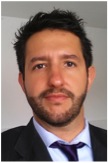Studying at the University of Verona
Academic calendar
The academic calendar shows the deadlines and scheduled events that are relevant to students, teaching and technical-administrative staff of the University. Public holidays and University closures are also indicated. The academic year normally begins on 1 October each year and ends on 30 September of the following year.
Course calendar
The Academic Calendar sets out the degree programme lecture and exam timetables, as well as the relevant university closure dates..
| Period | From | To |
|---|---|---|
| MED ING annuale | Oct 2, 2024 | Sep 30, 2025 |
| MED ING 1° semestre | Oct 2, 2024 | Dec 20, 2024 |
| MED ING 2° semestre | Jan 2, 2025 | Sep 30, 2025 |
| Period | From | To |
|---|---|---|
| Tutti i Santi | Nov 1, 2024 | Nov 1, 2024 |
Exam calendar
To view all the exam sessions available, please use the Exam dashboard on ESSE3. If you forgot your login details or have problems logging in, please contact the relevant IT HelpDesk, or check the login details recovery web page.
Should you have any doubts or questions, please check the Enrollment FAQs
Academic staff
Study Plan
The Study Plan includes all modules, teaching and learning activities that each student will need to undertake during their time at the University.
Please select your Study Plan based on your enrollment year.
1° Year
| Modules | Credits | TAF | SSD |
|---|
2° Year It will be activated in the A.Y. 2025/2026
| Modules | Credits | TAF | SSD |
|---|
3° Year It will be activated in the A.Y. 2026/2027
| Modules | Credits | TAF | SSD |
|---|
4° Year It will be activated in the A.Y. 2027/2028
| Modules | Credits | TAF | SSD |
|---|
5° Year It will be activated in the A.Y. 2028/2029
| Modules | Credits | TAF | SSD |
|---|
6° Year It will be activated in the A.Y. 2029/2030
| Modules | Credits | TAF | SSD |
|---|
| Modules | Credits | TAF | SSD |
|---|
| Modules | Credits | TAF | SSD |
|---|
| Modules | Credits | TAF | SSD |
|---|
| Modules | Credits | TAF | SSD |
|---|
| Modules | Credits | TAF | SSD |
|---|
| Modules | Credits | TAF | SSD |
|---|
Legend | Type of training activity (TTA)
TAF (Type of Educational Activity) All courses and activities are classified into different types of educational activities, indicated by a letter.
Laboratory Medicine (It will be activated in the A.Y. 2026/2027)
Teaching code
4S012567
Credits
4
Scientific Disciplinary Sector (SSD)
-
Learning objectives
The training objectives of the course are:
-knowledge of the assumptions and general criteria for interpreting laboratory tests based on the concepts of normality, reference intervals, intra- and inter-individual analytical and biological variability:
-interpretation of the diagnostic value of laboratory tests, in terms of specificity, sensitivity, positive and negative predictive value;
- knowledge of the fundamental principles of laboratory methodologies in the pre-analytical, analytical and post-analytical phases;
- knowledge of the pathophysiological meaning underlying the alterations of laboratory indices and ability to integrate these alterations with the signs and symptoms clinically detected by the anamnesis and physical examination to arrive at a diagnostic interpretation of the most important clinical syndromes;
-recognize, on the basis of the pathophysiological and clinical significance of the laboratory tests, the reasons for the examination requests, the operational logic and the semiological value of the individual tests in a typical clinical case series;
-learn the prerequisites of expert systems for analysis and validation of laboratory data and image digitization;
-understand the role of automation in the modern clinical laboratory;
-learn the principles of telemedicine and remote validation.
Clinical Biochemistry - Laboratory Medicine Module
The specific objectives of the module are the knowledge of the pathophysiological mechanisms and the interpretation of laboratory tests relating to individual organs and systems, referring in particular to the following topics:
-blood count;
-blood coagulation system;
-carbohydrate metabolism and diabetes;
-lipid metabolism, atherosclerotic disease and its complications;
-acid-base and hydroelectrolyte balance;
-plasma proteins and inflammation indices;
-renal function; liver function;
-acute myocardial infarction;
-enzymes in disease diagnosis and monitoring;
-tumor biomarkers;
-main endocrine alterations (thyroid, adrenals, gonads, phospho-calcium metabolism);
-pregnancy monitoring;
-molecular biology applications.
Further objectives are knowledge of the main genetic diseases and related identification tests, and knowledge of the general principles and main methods of therapeutic drug monitoring.
Practical Teaching Module of Laboratory Medicine
The objectives of the module, to be achieved through small group exercises, are:
-ability to perform and interpret a haemocytometric test and the main haemocoagulation tests;
-performing a rapid blood sugar test;
-interpretation of the main lipid metabolism tests;
-interpretation of tests for the evaluation of acid-base and hydroelectrolyte balance;
-results of renal and liver function tests.
Examination Methods
Oral examination finalized to verify the knowledge of the course contents.
Evaluation criteria
The test ascertains the level of knowledge of the theoretical contents and the ability to use language in describing the contents of the program. The final vote is considered positive for a score equal to or greater than 18/30.
Free choice courses
Modules not yet included
Career prospects
Module/Programme news
News for students
There you will find information, resources and services useful during your time at the University (Student’s exam record, your study plan on ESSE3, Distance Learning courses, university email account, office forms, administrative procedures, etc.). You can log into MyUnivr with your GIA login details: only in this way will you be able to receive notification of all the notices from your teachers and your secretariat via email and soon also via the Univr app.

 giuseppe.bertini@univr.it
giuseppe.bertini@univr.it
 045-802-7682
045-802-7682








